|
SMOKING NEIGHBOURS SHOULD BE
CONTROLLED BY NEW LAWS
Smokers are becoming more aware that they should
not subject their children to the dangers of passive
smoking. The result is they go out onto the balcony
to smoke and thus inflict the pollution on their
neighbour's children, particularly in areas of
high-density development, which are very much on the
increase. We have received many complaints from
parents and others desperate to find some relief from
many hours exposure every day and every night.
One very sad case was that of a young mother who brought
her first baby home from the hospital only to
realise that she could not open the bedroom windows to give
the baby fresh air because of the constant
pollution of cigarette smoke coming from her chain smoking
neighbours.
Complaints to Councils and Departments of
Health and Housing were a waste of time because they have no
legislation or local ordinances that can be brought
to bear on the issue. The problem has been recognised
overseas and we try to give comfort to people
by telling them we will try to follow the lead of Maryland
County in USA which banned smoking where it would
intrude on a neighbour's air-space.
Legal Position
Our first move has been to talk to lawyers about
the possibility of some kind of legal action as a
test case to enforce the fundamental rights of any
person to the quiet enjoyment of their own home
and air-space which surrounds it. We are told that
actions under common law principles of
negligence and private nuisance could possibly
succeed but they are not over confident about it.
To establish negligence you have to establish your
neighbour's duty of care towards you and you
have to show tangible damage as a result of
breach of that duty. In the case of asthmatics or
people with special sensitivities such damage
would be more tangible that in the case of healthy
individuals. A win in such action would provide a
sum of damages related to the damage suffered.
However for our purposes a win in principle with
the possibility of many to follow would cause our
legislators to sit up and take real notice of the
problem.
An action in private nuisance would have to
establish that the smoke invasion represented a
breach of property rights and that it was both
substantial and unreasonable in all the
circumstances. Whether the interference is
"unreasonable" is decided according to the
ordinary usages of people living in society and not
those of abnormal sensitivity, such as asthmatics.
Allowance must be made for reasonable "give and
take, live and let live" principles. These
arguments would depend on the extent to which a
modern court may accept that nicotine drug taking
is a reasonable pursuit of ordinary people living in
today's society. We non-smokers would have
decided views about that, but what view would a
particular court and judge take on the issues? A
win on private nuisance would have the advantage
that a permanent injunction would be granted to
stop the smoking neighbour from ever repeating
the offence. This is as distinct from an award of
damages which would require a new action each
time there was a repeat offence.
Present Legislation
The provisions of the Smoke-Free Environment
Act 2000 and the 1983 Occupational Health and
Safety Act in NSW do require the "common
property" areas of all flats, units and town houses
to be smoke-free. These are both enclosed public
access areas and are deemed as workplaces under
relevant legislation. Of course having a law that
says "No Smoking" and getting someone to
enforce it are two very different things, as we well
know from our experiences with smoking laws on
railway stations.
The Environment Protection Authority (EPA) also
has a responsibility under its legislation to
enhance the quality of the environment in NSW
and to reduce the risks to human health and
prevent degradation of the environment in which
people live. We will be pushing all these buttons
in order to get some attention to these problems.
All councils have high-sounding Environmental
Protection officers under these regulations.
However do the words mean what they seem to
say? In theory we can report each exposure to
carcinogenic chemicals released into the
atmosphere as a reportable environmental offence.
That would keep a few council staff busy
investigating for a while.
Political Position
Polluting the air around a suburban residential
home or unit is the same as the problem we had
with backyard incinerators years ago. Each
smoker is just another personal incinerator fouling
other people's air space. Cigarette, pipe and cigar
smoke pollution may not be as severe in intensity
but it is equally offensive to the lungs and carries
an even higher health risk. Exposure is more
prolonged because while people may burn off in
an incinerator once per week the smokers foul the
air every half hour both day and night.
To test the water and make a start on what will be
probably be a long road to new legislation
controlling residential smoking we have written a
series of letters to three politicians representing
constituents who have this problem. One such
case concerns our member Tina (name withheld)
shown in the photo with NSMA President, Brian
McBride, helping to present her case to her local
State Member of Parliament, The Hon. John
Watkins, Minister for Education.
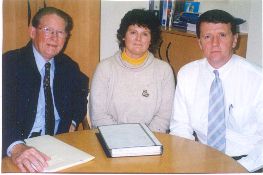
Brian McBride and Tina present case for smokefree
public housing to local state M.P. The Hon.
John Watkins Minister for Education
Mr Watkins was very understanding of Tina's
problem with constant exposure to cigarette
smoke because she suffers from asthma. He has
undertaken to make representations to the
Minister for Housing who is effectively Tina's
landlord because she is a public housing tenant.
NSMA have indicated to the Minister that we are
compiling a database of tenants suffering
detrimental health effects with a view to
launching a class action against the common
landlord failing in the duty of care to provide
accommodation which is free from known health
risks.
Another critical case is Lucy (name withheld)
located in Canberra. She is in very poor health and
has very sensitive allergies to cigarette smoke.
Her doctors have certified that she must not be
exposed to passive smoking at any time for any
reason. Again, we have written to the authorities
advising that we intend to support legal action
against them if they do not resolve the problem.
Lucy's MP is Mr Bill Stefaniak, and like John
Watkins he is sympathetic to the problem and has
undertaken to make representations about it.
Unfortunately in both cases the politicians'
preferred solution seems to be to move the non-
smokers away from the smokers. We strongly
object to this and insist that it is time for a policy
of segregating the polluters away by themselves
and leaving the "normal" non-smokers in their
established homes. We are really fed up with the
tendency of politicians to treat smokers as sacred
cows who must not be challenged or
inconvenienced in any way. If anyone is going to
be inconvenienced by having to move or take
downgraded housing it should be the smokers not
the non-smokers.
Both Tina and Lucy are very grateful to NSMA
for giving real recognition and support for their
arguments. We in turn are grateful to them for
sticking to their guns and demanding the simple
right to breathe clean air in the own homes. Their
courage provides us with a platform to launch
calls for reform in public housing and then by
implication and new legislation extend it to all
housing. We can hardly call ourselves a civilised
society if we give preference to drug addicted
polluters of the environment and expect other
citizens to just put up with it in their own homes.
Action Point 1. Write to The Hon. John Watkins,
Minister For Education, Parliament House,
Macquarie Street Sydney 2000. Tell him that you
support the principle of segregating smokers away
from smokers in public housing. Insist that each
complex should be designated either smoking or
non smoking. Also write to you own local MP
along the same lines and ask for a reply on policy
before you vote in the March 2003 election.
WORLD NO TOBACCO DAY 31 MAY 2002
The photos show members of NSMA handing out
leaflets at Central railway station calling for total
bans on smoking on all railway property. We
urged people to speak up about the current
anarchy amongst railway staff where enforcement
of existing bans depends on the personal attitude
of individual station managers. Some do a good
job on request but most refuse to enter the
smoking regulations debate and let smokers do
what they like with impunity. The leaflets also
gave details of Department of Health phone
numbers (02 9391 9111) to report restaurants or
hotel dining rooms that do not totally ban
smoking.
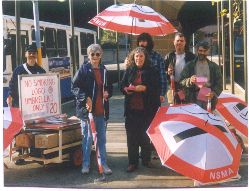
NSMA Volunteers Sell Anti Smoking
Umbrellas at Central Railway on World Non Tobacco Day
We also urged the public to support our
fundraising efforts by purchasing our umbrellas,
which carry the NO SMOKING logo spread over
the whole surface of the umbrella. However our
efforts were soon curtailed by officious railway
security that said they were responding to
complaints (from smokers) that we were
obstructing pedestrian traffic. We were forced to
move to new locations several times but we are
used to being on the wrong end of railway
security and our cheerful volunteers accept it as
par for the course.
IT'S NO ACCIDENT BUT IT WAS INCIDENTAL
Our last Update 39 reported that we had lodged a
complaint with the Australian Broadcasting
Authority (ABA) about the image shown above.
We said that it was an advertisement for tobacco
and therefore was a breach of the Tobacco
Advertising Prohibition Act 1992 (TAP). We
complained that both Channel Seven and Channel
Nine had breached the Act by repeated broadcasts
of this footage in its news segments morning noon
and night on 1 April 2002.
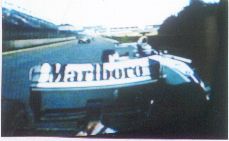
This tobacco advertisement is "Incidental"
to the scene on your TV screen according
to the Australian Broadcasting Authority
On 14 June we
received a nine-page report of all the convoluted
reasons why it was not an advertisement for
Marlboro cigarettes that actually breached the
Act. This is what their report told us:
The ABA considered three questions:
Q1. Whether it was a "tobacco advertisement" as
defined by section 9 of the Act.
The answer, we were pleased to note, was that
yes, it was an advertisement for Marlboro
cigarettes. Indeed they said quote, "In ABA's
view the broadcaster need not have any intention
to publicise or otherwise promote smoking for a
finding to be made that a tobacco advertisement
has been broadcast. Subsection 9(1) of the
Tobacco Advertising Prohibition Act 1992 (TAP),
should be construed to mean that relevant material
that promotes smoking by giving publicity to
smoking would satisfy the definition of "tobacco
advertisement" even if the material does not
intentionally promote smoking.
So far so good!
Q2. Was the broadcast permitted under the
exception provided by section 14 of the TAP Act?
In other words was it either an ACCIDENTAL
OR INCIDENTAL accompaniment to the
broadcasting of other matter?
This is where the convolutions start revving over
faster that Schumacher's engine!
Firstly it was no accident. ABA admit that both
broadcasters say the particular shot was
deliberately selected and placed within the news
segments concerned because of its subject matter.
ATN 7 said quote, "this footage was chosen solely
because it shows the actual moment of collision
and resulting debris from Montoya's car".
Similarly, TCN 9 says, "The footage chosen by
nine was the footage that most clearly captured
that sequence of events".
However, concludes ABA it was "incidental" to
the main broadcast, which was the accidental
clipping of the following racing car. ABA goes on
to quote the definition of "incidental" meaning
"happening in fortuitous or subordinate
conjunction with something else". They went on
to give several more pages to justify their
conclusion quote, "The ABA is of the opinion that
a tobacco advertisement broadcast in this
particular context remains entirely subordinate to
the main matter being broadcast".
Q3. Was any direct or indirect benefit received
for the broadcast of the tobacco advertisement?
Both ATN 7 and TCN 9 stated that no direct or
indirect benefit was received for broadcasting the
particular shot including the tobacco
advertisement.
The ABA accepts those assurances without
question. That completes the sanitising of tobacco
advertising on our TV sets. If it's incidental to
something and you don't get paid for it then it is
quite OK.! What a joke!
So there you have a loophole big enough to drive
twenty racing cars through. The ABA totally
ignored the foundation logic of our complaint,
which was that the camera was mounted facing
the Marlboro advertisement. Hence it was
deliberately placed to ensure that any footage
from that camera must include the advertisement.
Indeed every inch of footage produced was
designed to be in fortuitous or subordinate
conjunction with its main purpose, which was to
provide a tobacco advertisement to anyone dumb
enough to accept it and rebroadcast it.
It was a loaded advertisement just waiting for
some newsworthy event to trigger its transmission
around the world to every nation including those
that have theoretically banned tobacco
advertisements. The tobacco companies are still
smarter than our bureaucrats and politicians who
draft such inadequate legislation.
Another example of this loophole was reported in
Update 39 about the complaint against Channel
Nine's 60 Minutes showing Russell Crowe
waving his cigarette packet in front of the camera
in a deliberate "product placement" exercise. The
ABA again agreed it was an advertisement and it
was not accidentally broadcast. However they
accepted TCN Nine's explanation that Russell's
words at that particular time were so critical to the
interview that they had to be broadcast and they
could not be edited out of this pre-recorded item.
This means that the advertisement then became
"incidental" to this world shattering interview so
it could then be broadcast under that exception
clause.
What a joke the BAT legislation and the ABA's
non enforcement is becoming!
Action Point. Write to Senator Alston, Minister
for Communications, Parliament House Canberra,
ACT 2600. Send him a copy of this article and ask
him if he is happy with these Clayton's bans on
tobacco advertising on TV. Ask for a reply
indicating that he will amend the legislation to
remove this loophole.
ANYHOW LETS HAVE ANOTHER GO!
We have now submitted several more complaints
including one about the TV advertisement for VB
beer played regularly through the State of Origin
Rugby League broadcasts by Channel Nine in
Sydney. These ads start off with a very loud and
stirring rendition of the musical theme previously
associated absolutely with the once legal ads for
Marlboro cigarettes. Those ads usually conveyed
the he-man image of cowboys lighting up a
cigarette. Now these new ads are accompanied by
an image of someone striking a match with a flare
up that covers the whole screen. Even to a non-
smoker like me this seems to be a powerful cue
for a smoker to light up a cigarette during the ad
break. And, while you are at it, you might as well
have a VB to quench your hard earned thirst.
I'm sure there is some collusion here between the
tobacco companies and the breweries to join
forces in a move that promotes both their
products while circumventing the tobacco ad
bans on TV. The problem is that it is too
sophisticated in its message to be proved a breach
by the ABA. Maybe we are getting paranoid about
this but we will keep the ABA on its toes to find
more and more reasons to see no deliberate
cigarette ads on our TV screens. Maybe their
responses will eventually provide us with enough
ammunition to convince our politicians to amend
the legislation to finally get rid of all such
loopholes.
SECOND-HAND SMOKE KILLS WOMAN WITH ASTHMA
Two managers of the Paribas Bank in Milan, Italy
have been convicted of criminal manslaughter in
the death of a female bank employee who suffered
a fatal asthma attack from workplace exposure to
second-hand smoke. They were sentenced to jail
and fined 50,000 Euros, reported the Italian news
agency, La Stampa. This criminal court decision
opens the door for a civil wrongful death lawsuit
by the employee's family to recover damages for
causing her death by smoke. Monica C. was 35
years old, married, and had a 10-year-old child.
She suffered from "poli allergic asthma", which
was known to her employer.
Her first job at the bank was in an office where
everything was fine. Then, she was transferred to
another area where the problems started. Her
husband told journalists She would tell me that the
office was full of cigarette smoke. She was getting
worse every day that passed. Various times, in the
months before she died, I had to take her to the
emergency room and often, during the night, she
had to wake up and inhale her asthma spray. In
September of 1999, she suffered a violent asthma
attack, was taken to hospital but medications
failed to save her.
This is a very important case in the progress of
world litigation against tobacco. All members
should put a copy of this article on their
noticeboards at work and also send a copy to their
personnel mangers. Any employer who has been
casual about the occupational health laws should
be stung into action by this dramatic case.
MORE LEGAL ACTIONS PENDING
The publicity surrounding Rolah McCabe's big
damages win have resulted in smokers making
contact with us for advice on their chances of
suing the tobacco companies. We are only too
willing to help and make sure they are referred on
to lawyers with experience in this area. We hope
that it results in many more successful cases.
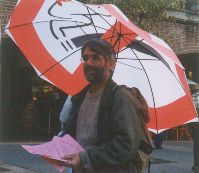
Volunteer Murray hands out leaflets
helping people to take anti smoking action
NZ WOMAN SUES BRITISH AMERICAN TOBACCO (BAT)
In the first such case in New Zealand, Janice Pou,
51, has filed a suit of more than $300,000 against
British American Tobacco (BAT) and WD & HO
Wills in the High Court at Auckland. BAT New
Zealand responded that it was a responsible
company and that it did not break the law. Their
spokesperson said; "The tobacco industry
manufactures tobacco products for informed
adults who choose to smoke. Decades of study,
public discussion and education show that both
the public and governments have long been aware
of the health risks associated with smoking.
Governments around the world allowed tobacco
products to be sold despite the health risks.
They have chosen to regulate them extensively and to
benefit substantially from their sale through the
high tax burden which is placed on them". He said
he would not comment more extensively as the
matter was going to court. Ms Pous lawyer John
French said yesterday that his client had smoked
30 cigarettes a day, on average, since 1968. She
became hooked on Capstan cigarettes, and then
later switched to Pall Mall king size, then
Winfield. The claim accused the tobacco
companies of negligence, he said. "It is based on
the allegation that the defendants conduct in
manufacturing, supplying and advertising
cigarettes led to her becoming addicted and that
she contracted lung cancer as a result." Ms Pou
had tried on several occasions to stop smoking but
her addiction was too great. It was hoped the case
would be heard within a year, said. David Collins,
QC who is acting as Ms Pous barrister.
FIRES CAUSED BY SMOKING
One of our members has twice been forced to exit
the YWCA Hotel in Wentworth Street Sydney as
result of false fire alarms. It is bad enough having
to climb down six flights of fire stairs in your
pyjamas but then to be told it was a false alarm is
a bit much. Our informant was furious because
she says the real cause of the problem is that
smokers are trying to defeat the smoke sensors so
that they can smoke in their rooms. Their clumsy
interference sets off the alarms and then everyone
suffers.
We wrote to the NSW Fire Brigade Service to get
them to put pressure on the YWCA management
to supervise their smoker's problem more
effectively. They replied that they have a policy
that imposes a fine of $250 when two or more
false alarms are activated in any 60-day period.
However they would not comment on whether the
YWCA should do more about enforcing a no
smoking policy. They said policies of this nature
are the decision of hotel management and as such
can only be policed by the hotel's management
and staff. We also complained directly to the
YWCA but they ignored our letter and did not
reply.
EMAIL WAR ON RAILWAY SMOKING PROBLEMS
Our member Andrew Dickinson is keen to use the
modern email tool to pile pressure on to the City
Rail's complaint service and for other efficient
ways of getting our message across re smoking
problems on the railways network. If you have an
email address please communicate to Andrew on
sharptongue@ozemail.com. He will then link you
in with what he is doing. It won't take a lot of
time on your part but it will multiply our
campaign effectiveness, so please make an effort
to help.
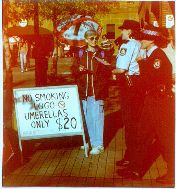
Smokers Complain so Police force us
to move off Central Railway location
LEGISLATION RE UNDERAGE SMOKING
David Oldfield MLC put up a private member's
Bill in NSW Parliament to make it illegal for
under 18's to smoke and thus give authorities
more power to act instead of finger-waving. As
reported in the last Update we support him but
much of the Health Lobby do not support him
because they say "We do not want to criminalise
kids". Anyway the proposed legislation will not
be debated until late August 2002.
SMOKING IN PUBS AND CLUBS
NSW state leader of the Democrats, Dr Arthur
Chesterfield-Evans, is still developing his private
members Bill to accelerate the inevitable action
on this next major advance in reducing public
smoking and improving the occupational health of
workers in the hospitality industry. Of course the
mainstream health lobby are cultivating union
action as the key to an early breakthrough. NSMA
have talked to various bar workers and handed out
literature inviting them to bite the bullet and take
action against their guilty employers. However we
find the major problems are that so many of these
young workers are smokers and, while they can't
smoke on the job, they feel a bit strange about
objecting to other people's smoke. The next
barrier is the obvious fear of losing their jobs if
they complain.
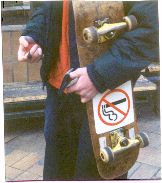
Young customer shows anti smoking sticker on his skateboard
QUEENSLAND RESTAURANT BANS NOW IN FORCE
As from 31 May 2002 the new laws banning
smoking in restaurants came into force in
Queensland. This is a big step forward and the
Queensland health lobby are to be congratulated
on finally getting there. However there are already
complaints in the media about the weakness of
this legislation. Like some other states, it only
applies to indoor situations. What we really need
is a law that bans smoking anywhere that food is
served. The warmer climate and a large tourist
population means that outside tables frequently
dominate the restaurant scene up there. Hence the
long suffering non smokers get no relief and are
prevented from using what are often the best and
most desirable settings. We must all keep
campaigning for total bans anywhere that food is
served.
NEW SMOKING GUN EVIDENCE
A team of scientists funded by the World Health
Organisation released an important new research
report in June 2002. It received wide publicity
because it not only confirmed the old news about
smoking causing the most common cancers in
lungs, stomach, liver etc., but it extended the list
to many other forms of cancer previously not
strongly linked to smoking. The group of 29
experts from 12 countries reviewed more than
3000 research papers including every significant
study on active and passive smoking. They found
that passive smoke was not only carcinogenic but
increased the risk of developing some forms of
cancer by 20 to 30 per cent.
Dr. Andrew Penman from NSW Cancer Council
was quick to use this report to recommend that the
NSW State Government should increase its
spending (from $1.6 million) to $14 million per
year to make a real impact on tobacco control in
this state. The State Health Minister, Craig
Knowles replied that they were doubling the
budget to $3.3 million and pointed to the recent
new legislation banning smoking in restaurants
and all enclosed public premises as evidence of
the good job they are doing.
Fair enough Mr Knowles, we do believe you are
lot more serious about the problem that that
previous smoking Health Minister, Andrew
Refshauge! However you still have a long way to
go to make up for lost time. We find it rather
galling to know that we have beat our heads
against the brick wall of Refshauge type politics
for the last twenty five years calling urgently for
bans on smoking in restaurants. Now we see the
Health Minister pointing to these long, long
overdue bans as "evidence" of how serious they
are about the smoking epidemic!
The real measure of how serious governments are,
both state and federal, is to calculate what
percentage of the $4.9 billion dollars received
from tobacco excise each year is put back into
tobacco control programs. The answer comes out
at about 0.08 per cent! This is morally equivalent
to finding that someone is putting $100 in your
bank account every few minutes as a result of
crime and criminal activities. You are so incensed
about it that you rush out and spend 8 cents in a
desperately serious attempt to stop it happening. It
just proves that old political principle that you can
fool most of the people most of the time if you
just keep saying it loud and often.
25th ANNIVERSARY DINNER
YES THE NON SMOKERS MOVEMENT WAS FORMED IN OCTOBER 1977 AND WE
INVITE ALL MEMBERS AND THEIR NON-MEMBER FRIENDS TO JOIN US IN A 25TH
ANNIVERSARY CELEBRATION DINNER.
TIME: DRINKS FROM 6.30 PM (Cash bar)
DINNER AT 7.30 PM
DATE: 6 NOVEMBER 2002
PLACE: CROWN FUNCTION ROOM
(1st Floor)
FURAMA CENTRAL HOTEL
28 ALBION STREET, SURRY HILLS
COST $38 PER PERSON
BOOKINGS: Please fill in the enclosed slip and
return. Early bookings appreciated to help with
planning and numbers will be limited to capacity
of room. Early bird bookings, received by 11
September, (a date to remember) will be given a
free commemorative booklet (value $10) on the
history of NSMA (one per two tickets)
GOOD STORIES - BAD STORIES
As part of our preparation for our 25 Anniversary
celebrations we would like to receive your stories
about your experiences in the bad old days. What
extreme lengths did you go to, to get a smoke-free
table at a restaurant? How many smokers did you
push off a ferry or throw out of your car? How did
you handle smoking relatives in various
situations? What methods were most successful in
getting your friends or work colleagues to quit?
We will give prizes for the best stories illustrating
the tribulations we have gone through on the long
road to controlling our smoke free environments.
We will read out the best ones at the dinner or you
may prefer to tell the story yourself.
SMOKEY MUSIC VENUES
Some new members are keen to do something
about the smoke pollution in the various licensed
venues that specialise in putting on good bands
and quality music. This includes such places as
the Empire Hotel at Annandale. Anyone interested
in joining forces to do something about the
problem please write in and let us know.
RAILWAY ACTION IN PERTH
Stop the train I want to get off! That seems a
reasonable request if you are being subjected to
someone's cigarette smoke. However when it is
the driver calling for help it a little unusual to say
the least. This is what happened in Perth when the
driver's co-driver refused to stop smoking. He
handed over to the co-driver and then demanded
that he stop the train so that he could get off.
Needless to say the authorities came down on the
side of the smoker and suspended the non-smoker
from duty. The union has now taken up the case
for the non-smoker and it will be interesting to see
what finally happens.
PASSIVE SMOKING RISK CONFIRMED
The American Heart Association has recently
updated its guidelines for preventing heart attacks
and strokes, listing second-hand smoke as a risk
factor for the first time and recommending that
people get screened for risk factors beginning at
age 20.
BLITZ ON UNDERAGE SALES
Underage teenagers have been recruited by the
NSW Health Department to test more than 1000
shops in an unprecedented blitz on the sale of
cigarettes to minors. The children, aged 13 to 16,
are being sent into shops across NSW during a
four-week campaign to try to buy cigarettes. The
blitz is the first co-ordinated, statewide with 1060
retailers being randomly checked. One media
sample showed only one shop out of 13 visited in
a Sydney suburb, sold cigarettes to the teenagers,
so the message is getting across. Meanwhile in
Victoria, a Fawkner convenience store manager is
the first person to be convicted of selling tobacco
to an under 18 under their new state laws. The
manager was fined $500 and ordered to pay $2500
in court costs.
SMOKE FREE DINING
July marks the twelve months anniversary of
smoking bans in restaurants in Victoria. The
media continues its coverage of the release of new
research in Victoria showing an increase in
support for smoke free dining. One former
restaurateur said he felt the ban had hit fine
dining, with patrons not lingering over dinner
because they can't smoke. However the Victorian
Health Minister John Thwaites pointed to the
survey results and said the majority of patrons
supported it. He predicted the response to smoke
free bars would be similarly successful within a
few years.
TASMANIANS HELPED TO QUIT
The Tasmanian branch of the Community and
Public Sector Union is forging new ground on the
smoking front. The union is negotiating a deal
with an interstate company to provide cheaper
quit smoking programs for its members. The
union says it will support people to achieve their
goal of quitting smoking.
LLEYTON PLAYS THE FOOL
Tennis fans would have been delighted to see any
Aussie win the Wimbledon trophy again after a
fifteen year drought. Many have reservations
about the previous brashness of Lleyton Hewitt's
behaviour on the court. They were therefore not
amused to see this revived with his stupid off-
court behaviour when he posed for photographs
with a cigar in his mouth. Someone should tell
him that smoking drugs is not part of the image of
a true sportsman and he will never be a real hero
unless he shows some responsibility to the
generations of youth who will be influenced by
his example either for good or bad.
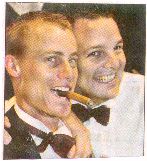
Lleyton Hewitt gives bad example to his young fans
Todd Harper from the QuitVic campaign went on
the John Laws radio program and criticised
Lleyton Hewitt for his bad example. He said, quite
rightly, that there is a serious issue here if role
models start normalising or glamorising smoking.
John Laws did not agree and called Todd mean-
spirited and a weasel. Well that's about what we
expect from an old smoker like John after his
many years of defending smokers' rights.
NICOWATER ALTERNATIVE
There is a company in the USA trying to market
Nicowater. It is water with nicotine added, hence
the name, Nicowater. It is designed for people
who are addicted to nicotine but are not allowed
to get their fix in bars and restaurants where
smoking has been banned. There are only four
milligrams of nicotine in each bottle and hence
there is no nicotine taste. They are using the same
nicotine that is used in patches and gums.
They described this water laced with nicotine as a
"refreshing break to the smoking habit". However
the US government's Food and Drug
Administration has now ruled that it's also illegal
so ending this company's bid to begin selling
bottles from July 2002. The crackdown had been
expected since the FDA ordered nicotine-laced
lollipops and lip balm off the market last April,
calling them unapproved drugs that had enough
nicotine to endanger children lured by the candy
resemblance.
DEMOCRATS PROPOSE BAN IN CARS
Sandra Kanck from the South Australian
Democrats has proposed a law to ban smokers
from smoking while they drive. She says the
police could enforce it in the same way they
enforce the ban on mobile phone use while
driving. She says the response from the public has
been positive. We fully agree because there have
been many serious accidents as a result of
smokers dropping lighted cigarettes on to their
clothes etc., while driving.
ROLAH McCABE APPEAL
Simon Chapman, Professor of Health University
of Sydney, has been in the media talking about an
ongoing study at the University of Sydney that has
uncovered information that cigarette companies
knew more than they admitted. He is supervising
a four-year research program related to the topic.
The largest tobacco damages settlement was in
1998 when $248 billion dollars was awarded to
the American State Governments. As part of the
settlement the tobacco companies had to agree to
make public the literature used in such cases,
which is about 40 million pages of incriminating
material. This included the shredded material
referred to in the Australian case of Rolah
McCabe in which the judge ruled out their
attempted defence and instructed the jury to
award her damages. Rolah's case is still under
appeal and should be heard in August 2002.
Simon Chapman believes there are three main
issues, that smokers are not to blame, many
people start smoking very young, for years the
industry denied smoking was bad, and it is the
way cigarettes were modified to make them more
addictive.
BUTT BINS AND LITTER PROBLEM
We have always argued that the tobacco industry
should be made to provide disposal compartments
as part of the cigarette packaging. After all, a
burning device requires a lot more consideration
than say a paper wrapper on a sweet. The latter
could be just held in your pocket until a suitable
garbage bin is located. You could not reasonably
do this with a cigarette butt hence the common
solution of just dropping it on the ground where it
finishes up in the waterways and finally the
harbour.
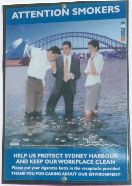
Posters show cigarette butts do end up in our waterways and harbours
Anyone with concern for the environment should
support this move to provide a simple heat
insulated compartment on the back end of the
packet where the smoker can easily dispose of
each butt until a litter bin is located. We have
written to Ian Kiernan at Keep Australia Beautiful
Campaign headquarters to convince him that his
organisation should give its support to this
initiative.
NO HOLY SMOKE - VATICAN BANS SMOKING
Starting July 1, 2002 the Vatican has announced
smoking will be banned on premises open to the
public, in offices and in vehicles used by the
public. Those caught smoking will be fined nearly
$30. The law, which was approved by Pope John
Paul II, did not specify the places where smoking
was banned but presumably they include the
Vatican museum, post offices, pharmacy and
other locations accessible to the public in the
otherwise closed city-state. While even Italy,
which has been lax on enforcement of smoking
bans, has begun to crack down, the Vatican has
been letting smokers puff away. Until this year,
smoking was permitted aboard the pope's plane
when he travelled abroad. It is now banned.
ACCC TO INVESTIGATE
South Australian Democrat, Senator Lyn
Allison, has criticised the ACCC for not doing
more about the devious and corrupt practices of
the Australian tobacco industry. She proposed a
motion that has been passed in the Senate. The
motion orders the ACCC to look into these
allegations. They will look at the use of the term
mild and light on cigarette packages. Anti-
smoking groups have welcomed the move, which
is long overdue. The new reference requires the
ACCC to investigate whether tobacco companies
have engaged in misleading or deceptive conduct
in their use of the terms 'mild' and 'light' and to
investigate document destruction for the purposes
of withholding information relevant to possible
litigation.
ILLEGAL EXCISE SHOULD HELP QUIT
A former smoker has begun an important legal
action against the tobacco industry in the NSW
Supreme Court. Miriam Corvan is seeking the
refund of excise that was invalidly paid by
smokers between July and August 1997. Last year
the High Court ruled the money should be repaid
to retailers but Ms Corvan's action will attempt to
establish that the consumers who paid the taxes
should benefit from the money, which is still
retained by the retailers and manufacturers.
Her case continues but meanwhile Premier Bob
Carr has commented on this and stated that
instead of the $250 million in cigarette taxes being
refunded to cigarette retailers, the federal
government should recoup the money and give it
to anti-smoking groups. We hope all the State
Health ministers will follow up on this.
For more detail on this see the review written by
Simon Chapman for the Sydney Morning Herald.
See http://www.smh.com.au/articles/2002/06/27/.
CIGARETTES FOR MENTALLY ILL
This is always a very sad almost no win
situation. However it is time some real corrective
action was taken against the long established
practice of supplying nicotine as cigarettes to such
patients as a form of therapy. The Schizophrenia
Association of Australia (SANE) say that
Australians with mental illness are dying at a rate
two and half times higher than average because of
smoking related diseases. They have developed
some resource materials to help carers and mental
health workers to deal with this problem. Ring
them on 03 9682 5933 for more information.
CLAYTON UTZ DEMISE
Full marks to the ABC TV for doing a great
expose on the complicity of this legal firm in
helping the tobacco industry by illegal means. We
are pleased to see they have been dropped from
the list of approved firms for government
contracts.
BROWN PAPER WRAPPERS
The Australian Democrats are calling for plain
brown wrappers on cigarette packets as part of a
scheme to ban all cigarette promotion. At the
drugs summit in Adelaide, Democrat Leader Mike
Elliott said he will move for a private members
Bill to make it illegal to promote smoking in any
way. It is great to see at least one political party
with a really serious policy against tobacco
promotion.
OMBUDSMAN REPORT ON SMOKING LAWS
Andrew Dickinson will soon be posting this 20
page report about City Rail's failure to enforce no
smoking laws on our website so watch out for it.
IMPORTANT REVIEW
Anne Jones, Director, Action on Smoking and
Health, has been doing media interviews
highlighting the importance of the federal
government's review on tobacco advertising laws.
She points to many forms of indirect advertising
of tobacco and says smoking in films and TV
shows, sports sponsorship and the internet are all
forms of advertising that need to be looked at.
QLD CLUB BANS SMOKING
There's evidence an introduction of a ban on
smoking on commercial premises does much
more than protect people's health. Apparently it's
good for business, too, as the Maroochydore Swan
Bowls Club has doubled its membership after
banning smoking.
VACCINE ANSWER
Medical researchers are working on developing a
nicotine vaccine. The vaccine could be
administered to teenagers, which would prevent
them from taking up smoking throughout their
lives. There is also research into vaccination
against other addictive drugs. It should not be
necessary but maybe it is the final answer to
protect our youth.
The Non-Smokers' Update is the quarterly newsletter
published for members of the Non-Smokers'
Movement of Australia Inc.. Contributions or
comments should be forwarded to the editor, Brian
McBride, at the address shown on the front cover.
|









